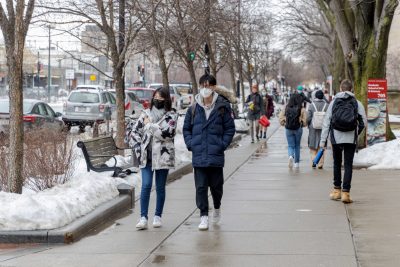
Two Cabinet secretaries from the Baker administration urged colleges and universities across the state to ease strict campus-wide COVID-19 protocols on Jan. 28.
“Our goal must now be to transition the COVID-19 Pandemic into an endemic,” the letter from Secretary of Education James Peyser and Health and Human Services Secretary Marylou Sudders read.
The letter noted that measures such as rapid testing, vaccines and digital vaccine cards “navigate the careful transition into opening up our society while simultaneously employing public health mitigation strategies.”
The secretaries also warned colleges and universities about the “twindemic,” a word used to describe the combined negative impact of COVID and social isolation.
“The impact of two years of social isolation, anxiety, stress and depression is profound and one we must confront and support individuals, their loved ones, and our community,” the letter read.
In response to the emergence of the highly transmissible Omicron variant, universities across Massachusetts adopted stricter COVID policies. At Boston University, testing increased to twice weekly for undergraduate students.
Yu-Ren Chen, a junior at Northeastern University, said he believes that COVID regulations should not be relaxed at the moment and the process of easing restrictions should be done slowly.
“I feel like they [schools] should always be prepared to make changes, and everyone should anticipate that,” Chen said.
Professors from the University of Massachusetts, Lowell and University of Massachusetts, Amherst wrote an op-ed in the Boston Globe on Jan. 20 about their observations of a decline in students’ mental health because of the pandemic and called for a relaxation of COVID policies.
Carlo Dallapiccola, professor of physics at University of Massachusetts, Amherst, said he had received numerous emails from students and parents complaining about students’ wellbeing.
“They [students and parents] were so happy to hear someone from the faculty pointing out these things because the impression that was being given is that the faculty is unanimously in favor of as many restrictions as possible,” Dallapiccola said.
Sam Kuo, a sophomore at the Berklee College of Music, said he feels the current measures of masking are a necessary safeguard to stop the virus from spreading.
“I don’t think I’m personally really easily impacted by any of those regulations,” Kuo said. “It probably has to take five minutes to get tested every week, but that’s pretty much it.”
Kuo said he thinks the school should not reduce the regulations because nobody wants to go back to remote learning.
“After lowering the regulations, although everybody’s vaccinated or got booster shots, it’s still very likely that there’s going to be spreading again and when the positivity rate goes high, [and] the school is still going to shut down and go back to online,” Kuo said.
Dallapiccola said masks are the “visible reminder” of the risk of gatherings and creates anxiety that things are not normal.
“Anyone who’s particularly vulnerable … they should probably consider wearing an N95 and being careful,” Dallapiccola said. “But everyone else, if you make masks [an] option …they’ll start the movement towards everything else and will feel more normal and carefree.
Paul Beninger, associate professor of Public Health and Community Medicine at Tufts University School of Medicine, said people will have “anxious responses” to seeing others wear a mask.
“All of a sudden you have that almost-PTSD kind of response,” he said.
The idea of imposing mask requirements on students and staff populations seems “totally unwarranted,” said Adrian Staub, professor in the department of Psychological and Brain Sciences at University of Massachusetts, Amherst.
“I think there has been a real acknowledgement that among many people, not everyone, that what we have done to college students has been too extreme,” Staub said. “And what we have done for that matter, at the primary and secondary levels for younger kids, has been very damaging.”
In the case that mask mandates are removed, those feeling concerned about rising infections will be “very well-protected” with a N95 mask, Staub said.
While Beninger supports the relaxation of social distancing rules, he said getting tested and wearing masks are still important for people along with the vaccination mandate.
“If we completely got rid of everything, we just wouldn’t be able to manage the number of cases that would go through the roof,” Beninger said. “There’s just no healthcare system in the world that would be able to manage that kind of response, so we still need to flatten that curve.”




























































































































Carlo Dallapiccola • Feb 4, 2022 at 9:45 am
Few people seem to realize that there are a number of universities here in the US (Georgia, Georgia Tech, Iowa, BOSTON COLLEGE) and abroad (Denmark, Sweden, Netherlands) where already there are no mask mandates and no ensuing catastrophic public health crises. In many of these universities, this was true already in Fall 2021, or even earlier. I leave it to the interested reader to look it up (and keep in mind how MA’s vaccination rates compare).
That PTSD could be the reaction to seeing some members of the vaccinated university community inside buildings without their faces covered speaks to the mental health crisis that we would do well to begin unwinding. That’s a reason to begin lifting these restrictions and re-normalize normality, not to prolong them indefinitely.
S Squeglia • Feb 4, 2022 at 5:37 am
These students who are young, healthy individuals seem to need to get over their fear of this virus. Covid will always be present, life must go on. Masks and shots won’t increase anyone’s safety. Time to accept the fact that the virus, like the flu, is here to stay.